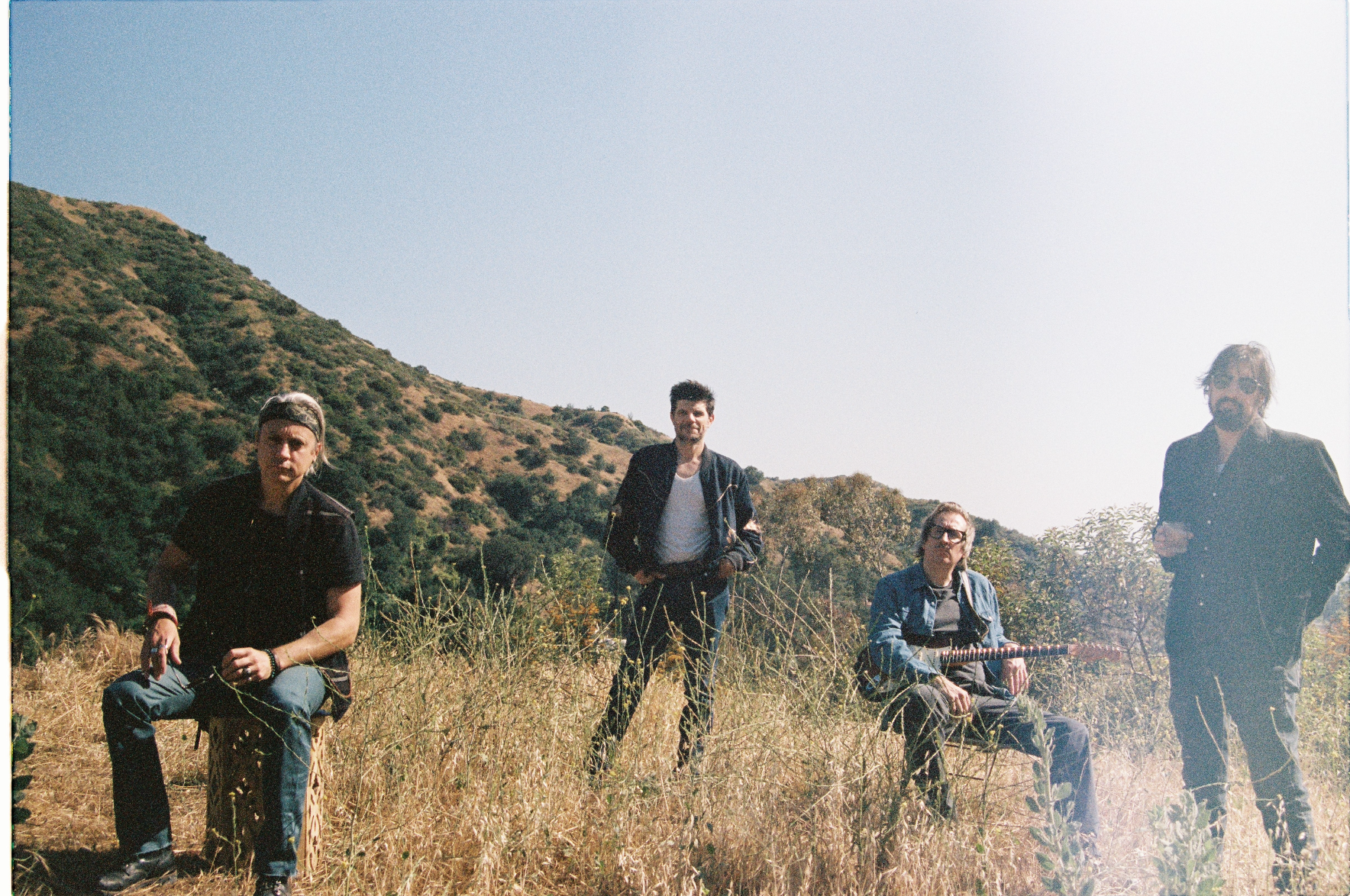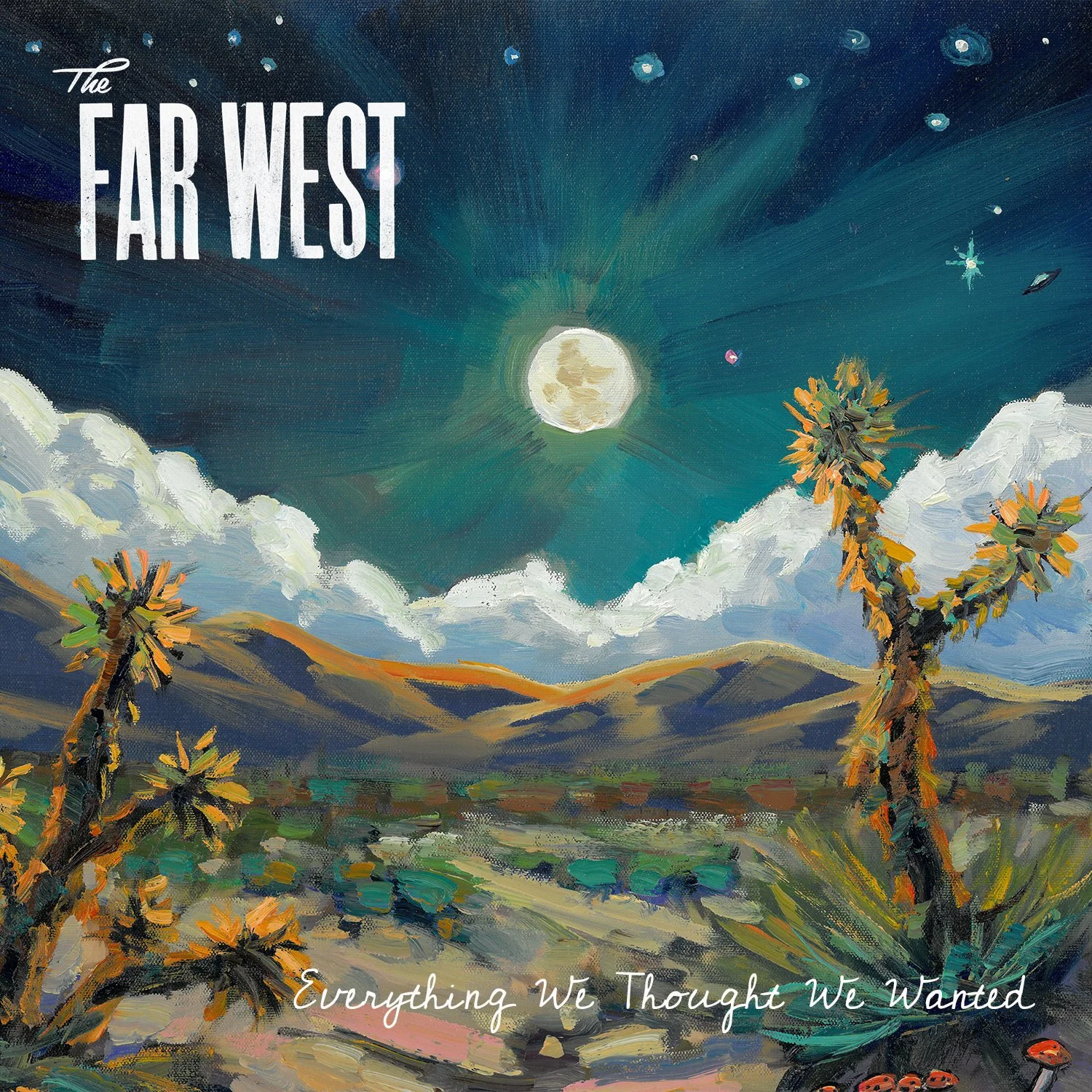THE FAR WEST 'Everything We Thought We Wanted' Interview
The Band
Brian Bachman – drums, backing vocals
Aaron Bakker – guitar, backing vocals
Robert Black – bass, backing vocals
Lee Briante – guitar, harmonica, vocals
Michael Whiteside – piano, organ, keys, backing vocals
Making a record is never easy — and for The Far West, it was nearly impossible. Their third album, Everything We Thought We Wanted, survived childbirth, a global pandemic, lost masters, and even the devastating Eaton Fire of 2025 that nearly destroyed the recordings forever.
The Los Angeles country/Americana band first made their mark with a self-titled debut in 2011 and Any Day Now in 2014, both recorded in unconventional spaces — a bar and a hot rod shop — with a raw, punk-like “first take, best take” energy. Those records earned them fans at venues like the Grand Ole Echo, Hotel Café, and Pappy & Harriet’s, and opening slots for Lucinda Williams, Jackson Browne, Steve Earle, and Dave & Phil Alvin.
This new album reflects their growth — emotionally, musically, and personally. Songwriters Robert Black and Lee Briante sharpened their storytelling, leaning into the real, lived-in emotions of heartbreak, resilience, and survival. “We’ve always said we like to make horribly painful songs you can dance to,” Black explains.
Recording was a journey of its own. The band snuck into a music school after hours to track songs on a vintage Neve console, captured Dave Alvin’s blistering guitar solo on “Hope I Don’t Bleed” (the day after Lee’s son was born), and later finished overdubs at home studios during COVID. Additional players — including Katie Stratton (The What Four) and the Hollywood Horns — helped expand the band’s sound into new, soulful territory.
Against all odds, Everything We Thought We Wanted became a bold, fully realized step forward for The Far West. It blends the influences of folk, country, soul, rock, and punk into something distinctly their own — timeless yet urgent.
“More than once, this record almost didn’t happen,” says Black. “But we refused to let it die.”
Can you tell us about the theme or concept behind this album?
Robert Black (bass guitar & songwriter) - This album represents a continuation of our ongoing fascination with American Music. We love American Music, from the blues and folk songs that emerged in the 1800s, the jazz and dance-hall influenced American Songbook from the early Twentieth Century, Country, Bluegrass, Rockabilly, Cajun, Soul Music, saloon singers like Sinatra and Tom Waits, Rock and Roll, Hip Hop and Punk Rock. All of these styles inspire us to write songs and we like to take all of these influences, merge, collage and reinterpret them in ways that are new to us. You may not hear all of the influence right away but they are there. As just one example, one of the songs on this record is, for us, a meeting of 70s Psych-Rock, Hank Williams and the classic Miles Davis' song 'In A Silent Way.' The Band we're doing something similar in the 1970s and they remain an inspiration to us now.
What was your main inspiration for creating this album?
Lee Briante (singer & songwriter) - I'm not sure there was a central theme or inspiration for creating this album. Robert and I are always writing songs on our own, making demos and then sharing them with each other and seeing what bubbles to the top. Thats kinda been our method since we started. We are always writing music with the goal of making a fantastic album. In this case, once we knew we had a track with Dave Alvin shreading a wicked solo, we knew we had to finish the rest of the album. For me, that really pushed me toward finishing this thing. The way I saw that deal...it's like we were a tiny bootstrap indie film, and somehow we got Denzel Washington in a pivitol role. If you have Denzel in your movie, you FINISH the movie, and thats how I look at it. We had to get it out. We had spent too much time, energy , money, blood, sweat and tears to let it sit on a hard drive somewhere.
What inspired you to create this album?
Robert Black - Personally I just can't stop writing songs. Sad songs about heartbreak and loss and most of all sad songs that you can dance too. It's weird because I'm generally a pretty upbeat person but I have experienced a lot of loss and personal tragedy and music always helped me get through it. Writing songs is probably what keeps me sane and able to function. I write songs hoping they will make other people feel better and not alone in this world.
Lee Briante - I think we've always wanted to make great records. Everyone in this band loves music, to the point of being almost musical historians. Albums mean a lot to each of us. We all love an album that is perfect from start to finish, and I think , for every record we make, that is the goal. To make a cohesive, meaningful record from start to finish. Like a good novel or movie, with a beginning, a middle and an end.
How would you describe the sound and style compared to your previous work?
Robert Black - It feels like we've all grown up a bit. Relationships, kids, perhaps a reassessment of just how much partying is still a good idea into adulthood. It's still the same old sad songs you can dance to but the topics are a bit weightier now.
Lee Briante - I think were starting to sound like ourselves. There is a Miles Davis quote that covers that “Man, sometimes it takes you a long time to sound like yourself.” I think this album is getting us there. It's more sonically complete because this is the first time we actually recorded in a studio. 1st album was recorded in a bar while it was open. 2nd was recorded in a hot rod shop.
Are there any tracks that hold special meaning to you? Why?
Robert Black - 'A Soft Place to Land' took me more than ten years to write, sometimes these things take time. It's the result of a long ago breakup that still hadn’t quite healed. The song tells the true story of a friends-with-benefits situation that helps to get the narrator through some long dark nights. We envisioned it as a song that we could play in a David Lynch movie.
Lee Briante - Right now they are all special to me. It's a small miracle that this thing is seeing the light of day. If they made the album, they are special, and I hope they find a home with the listeners.
Did you collaborate with any other artists or musicians? How did those collaborations happen?
Robert Black - Dave Alvin is a fucking legend in Los Angeles. I grew up listening to The Blasters, the band he started with his brother Phil in the 1970s. It was punk rock but so much more; roots, soul, et al. They even recorded a song called 'American Music' that has been a mantra for me ever since and, it was the perfect thing to listen to for a kid who loved The Ramones but also all of the Hank Williams and Buck Owens records I'd heard growing up. We were lucky enough to open for Dave and Phil Alvin on a U.S. tour and at the end of it everyone was getting along so we turned up our courage and invited Dave to come to the studio and record a song with us. To our surprise he agreed and the result is an absolutely scorching guitar solo on our song 'Hope I Don't Bleed.' It is truly the Devil's music.
Lee Briante - We also are joined on a track by Katie Stratton, who we have been friends with for over a decade. She has a new band called The What Four folks should check out. We knew we needed a female voice on 'For The Birds' and we thought of her right away. She made it her own and nailed it in one take. Nic Chaffee , who has done horns for us in the past, joined us again on this record. We also had a kind of impromptu student horn section come together on 'These Lies' , which is really beautiful work that has a deflated quality I love.
Were there any challenges or unexpected moments during production?
Robert Black - This album almost never happened. We started out sneaking into a studio at a school of music engineering that our keyboard player was teaching at. When covid hit the school closed and the masters were lost for around a year. When we found them again we decided to finish the album at our guitarists studio that he used for overdubs but the drives wouldn't load. When we finally got them working again, we finished the record but his studio burned down in the Eaton fire of January 2025 along with his home. A last minute dash into a neighborhood in flames saved the masters and most of our vintage gear.
Can you share any interesting stories from the recording studio or tour?
Lee Briante - Getting Dave Alvin in the studio was huge for us. It happened to be the day after my son was born. We did not want to risk asking Dave to postpone, so my wife encouraged me to take off from the hospital for a few hours to get to the studio. That was a really special couple of days! When Dave rolled up, one of the guys had to open a gate so he could drive in the parking lot. I remember asking what kind of car Dave was driving. I think Mike looked at me like I was crazy. I don't know why, I just imagined him driving a big old Cadillac like Boss Hogg, or a converted hearse or something. The guys looked at me like 'huh? what the fuck are you asking?'. I mean, I was excited, I hadn't slept in 3 nights, if you told me he rode in on a lightning-bolt I woulda believed it. I mean that's what his solo sounds like anyway.
What message or emotion do you want to convey to your audience?
Robert Black - We played a show in Boston once and after the show someone was asking around about who had written a certain song. It was me, so they came over to say that they had drive across three states just to say how much the song had meant to them in the depths of their sorrow and then, they turned around and left. Never saw them again but I get it. My message is, whatever it is you've been through we've been there too and we got you. We have also plumbed the darkest depths; we see you and you're going to be all right.
Lee Briante - A song to me is like a musical journal entry. I'm not sure I have a goal of conveying anything in mind when I write. I'm just trying to get it out of my head. If a song connects, it connects. A song speaks for itself, which is to say, I'm not trying to sell it, it is what it is.
How does this album reflect your personal growth as an artist?
Lee Briante - Like I mentioned earlier, I think we sound more like ourselves on this album than earlier ones. We have such broad influences from so many different genres, from over 100 years of recordings we draw from. I think in 2011, with our self titled album, we were trying to capture our more country & western influences. I think we can do that really well, and I think we could be a really great country & western band if we wanted to go all in on just that genre. But now we are more willing to allow ourselves to enjoy pulling from all our influences, which certainly include Country & Western music, but we also equally love jazz, rock, punk, bluegrass, soul and everything else. So, I think you see a broader scope of influence coming through the lens that is The Far West than we allowed in the past, and I think that makes us sound more like ourselves than ever.
Were there any specific instruments or production techniques that shaped the sound?
Robert Black - Our keyboard player was working at a school of music engineering in Hollywood. We would sneak in at night and record using an amazing vintage, hand made Neve console that was rumored to have been used by Fleetwood Mac and Steely Dan. The sound was instant magic, warm, analog sounds reminiscent of the 1970s emerged in the booth and it immediately changed our approach to these songs. The album has a laid-back, Cosmic California Country sound - slightly stoned.
Are there any lyrical themes or narratives throughout the album?
Robert Black - The Desert emerges a lot in this album. Whether it's the literal desert of the American Southwest that we reckon with on the regular, the desert of the soul where you might find yourself alone in a hotel room one night pouring your heart out or, the desert of the heart, wrung out and bereft with nothing left to give.
Lee Briante - We cover lost love, yearning and longing pretty well.
What are your plans for promoting it? Can fans expect live performances or videos?
Robert Black - We are hitting the road in September with stops in Southern California, Arizona, New Mexico, Oklahoma, Arkansas and Tennessee. That's just the start, expect to see us in your town sometime next year.
Lee Briante - We have a few videos coming out, including a cool animated one by Preston Spurlock I'm excited about for 'Hope I Don't Bleed'. It's got a lot of ghouls and fun characters, including cartoon versions of us.
If you could remix any song on the album, who would you feature?
Robert Black - If we're talking wish list there are so many artists I would love to collaborate with; old school cats like Willie Nelson, Dylan or Lou Reed (I know Lou's gone but so are most of the people I would like to collaborate with and, if this is a wish list, let's wish big), people I grew up listening to like Billy Bragg, Nick Cave, Q-Tip from Tribe. The Marias are a newer Los Angeles band that I think would make an interesting collaboration.
Lee Briante - I would not remix anything. I get demoitis (a phenomenon where a musician or listener becomes so attached to a demo version of a song that they find it difficult to accept any subsequent, potentially superior, mixes or versions)
What advice would you give someone with a dream?
Robert Black - I had an art teacher tell me once, regarding a career in the arts, "if you can do anything else, do that." If you can't do anything else but be an artist then be singular in focus and be prepared to gather around you all of the people that can help and support you and tell all of the naysayers to go get fucked.
Lee Briante - I like the saying 'follow your dreams....right into your parents basement'. But also, what Robert said. If you absolutely cannot let it go, then it is your duty to take it as far as you can. The pursuit won't even feel like a choice.
Website: http://www.thefarwestofficial.com/
Instagram: http://www.instagram.com/the_far_west
Facebook.com: http://www.facebook.com/thefarwest
Instagram: the_far_west
Photography credit: Molly Perez
Sarah Ruttinger
Cover art paintings by: William Hawkins
Stereotype Co’s mission is to shine light on dreamers around the world.
Your support helps us continue make a difference.




